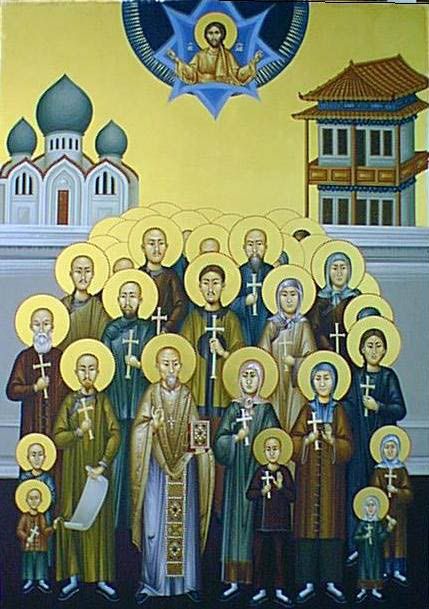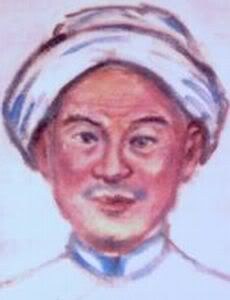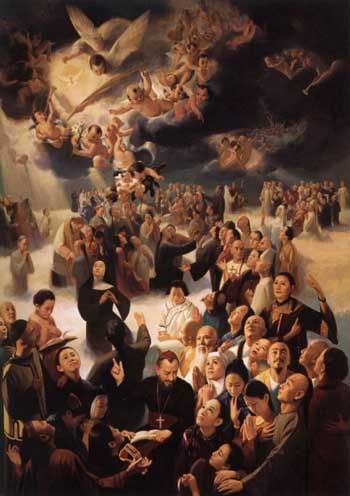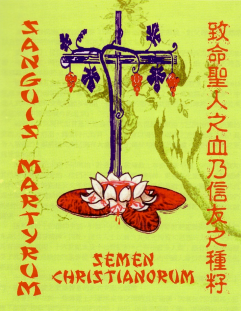The earliest martyrs of China are recognized in the early 17th century, although Christianity in China is recorded as early as the Tang Dynasty (in the 600s). In the 1600s, however, the Emperor became bothered by the frequent requests of his people for baptism and participation in organized religious rites. Christians were being persecuted in neighboring Japan at the time, and this is also thought to have influenced the first wave of anti-Christian sentiment which resulted.
In 1648, the first martyr of China is recorded. Blessed Francis Fernandez de Capillas, a Franciscan brother and teacher, was beheaded while praying the Holy Rosary and meditating on the Sorrowful Mysteries. Subsequent to his death, persecution increased across the continent, growing in frequency and intensity. Official decrees followed in 1805, 1811, and 1813, ordering persecution against those who were seeking ordination, studying Holy Scripture, and practicing as servants of the Church. Those who voluntarily renounced their faith were saved from harsh punishment. During this time, Saint Jerome Lu and Blessed Lawrence Wang were martyred.
Saint Jerome Lu was born in Mao-Cheu, China where he joined the church at an early age, working as a catechist and teaching the Holy Scriptures to his neighbors. Upon discovery in 1858, he was beheaded in his hometown at Maokou. Blessed Lawrence Wang has a similar story. Born in Kuy-yang, he also served as a catechist in Maokou, and was beheaded with Saint Jerome in 1858. Along with Saint Jerome and Blessed Lawrence, a third catechist was beheaded, Blessed Angela Lin Zao, after failing to renounce Christianity and the Rites of the Catholic Church. They were ordered to be tortured and executed by the Mandarin of Maokou, and likely died (like their predecessors), praying the Holy Rosary together.
Active persecution of Chinese Christians ceased in 1846, during a 50 year period of tenuous peace with foreign traders and pressure from the outside world. However, during the bloody Boxer Rebellion on 1900, newer and harsher edicts were proclaimed against Christians, resulting in the deaths of 86 recognized Catholic martyrs during that year alone. It is estimated that thousands of Christians gave their lives during this uprising for their faith.
Harsh persecution of Christians ceased in 1930, although with the rise of communism in China, few personal liberties to practice Christian faith were permitted. Rather than death, imprisonment became a common punishment for those who failed to renounce their faith. In recent decades, this has improved, with organized (state-monitored) religious gatherings allowed.
The road for Christians in China, and many other countries, has been long, difficult, and oftentimes dangerous. These courageous men and women of faith have clung tightly to the Gospel, finding their peace in Christ in the most difficult of times, and never losing site of the promise of redemption and personal resurrection. These “new” martyrs of China endured dangers and persecution, declaring their belief in Christ, and their extravagant love for the Lord. As Saint Thomas Aquinas (whose feast we also celebrate today) tells us, “The things that we love tell us what we are.” This begs the questions: What are we? What do we love? and How do we show that love to the world?
Day 28 of 365
Prayer Intentions: Courage and Faith
Requested Intentions: Reconciliation of struggling marriages (A); Reconciliation and healing in personal relationships (N); Safety for friend deployed to Afghanistan (S); Those considering or having attempted suicide (Pr. L); Those who serve the Archdiocese of Los Angeles (N); Safety of friend/ relief worker in Haiti (L); Health and safety of new daughter (J); Renewal of loving Christ-centered relationship (A).











0 comments:
Post a Comment
Thanks for leaving a comment. If you wish to submit a prayer request, however, please do so above, using the "Contact" tab.